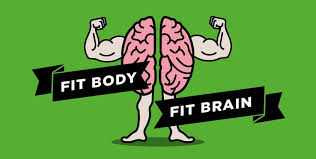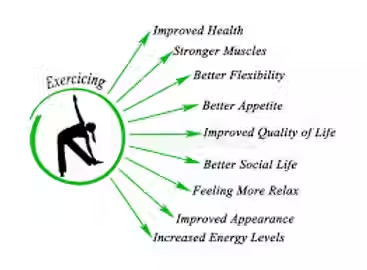The Impact of Exercise on Physical, Social and Emotional Health
- Learning for Life and Work

- May 5, 2020
- 4 min read
Updated: May 7, 2025
What is exercise?
Exercise involves engaging in physical activity and increasing the heart rate and your breathing rate beyond resting levels. This does not necessarily mean that you need to spend long periods of time in the gym but rather, it can be included in everyday life. For example walking to and from school, cycling, taking the stairs instead of the lift.

What is the recommended amount of exercise a person should do?
The UK government recommends that adults should aim to do 30 minutes of exercise five or more days per week. Children and young people should do around 60 minutes every day.
Why is exercise important?
Exercise is an important part of preserving physical, emotional and social health. Keeping physically active can prevent major illnesses and is the basis for a healthier lifestyle.

There are many short term benefits to a person's physical health if they exercise regularly. These include:
1. Losing weight - if you begin an exercise regime then a person will burn excess calories.
2. Sleeping better - as exercise works the body and a person may be tired by night time.
3. Better flexibility - as when exercising, the muscles are being stretched.
4 An increase of energy levels - as during and after exercise, blood is pumped all around the body.
5 An increase of blood flow to the brain and therefore concentration is improved.
6 An increase in body temperature which stimulates glands, nerves, common joints and the circulatory system.

When exercise is done regularly, as part of routine, over a long period of time, it can:
improve a person's body shape, muscle tone and posture.
strengthen a person's bones and muscles.
increase a person's stamina, endurance and balance.
strengthen a person's immune system which fights infections.
reduce a person's risk of type 2 diabetes, heart disease and some cancers.
reduce a person's blood pressure.
prevent health problems by increasing a person's good cholesterol and decreasing the bad cholesterol in a person's body.
help control and maintain a healthy weight.
prevent premature ageing.
promote a healthy growth and development in children.

A person's social health can be improved by leading an active life. Exercise has many benefits on a person's social health. These include:
being more active and having more energy. This helps a person develop friendships as they can arrange to go running/walking together or attend the gym together.
helping the person meet and make new friends, especially if they join a sports team, gym or exercise class.
getting opportunities to form relationships with like-minded people who enjoy exercise as part of a healthy lifestyle.
making friends or exercising with others which can give a person a sense of belonging and contribute to a more socially healthy person.
improving a person’s self-esteem and self-confidence because they feel good about themselves as they feel fit and healthy and so enjoy exercising with other people.

A person may enjoy exercising as they like to focus on fitness and a hobby they enjoy. This benefits emotional health as they are doing something they enjoy.
Exercise can help to relieve/escape the pressures/stresses of school and family life by giving the person time to themselves. This benefits emotional health as often, at this time, they reflect on life and how to deal with issues and stresses.
Taking part in exercise at the gym will help to improve a young person’s self-esteem and self-confidence, making them feel good about themselves/fit and healthy, which contributes to healthy emotional health.
Physical activity helps to get rid of stress and aggression in a harmless way and so can help a person feel good. This benefits emotional health as the person may feel in control and content with themselves.
People who exercise tend to be more optimistic and happy, energised and generally in a better mood which benefits emotional health.
Physical activity can give a person something to aim for, provide a challenge and increase motivation and ambition, which benefits emotional health.

A young person may meet more people at sporting activities which may increase their circle of friends.
Taking part in sport and exercise improves a young person’s self-esteem and self-confidence as they feel good about themselves - feeling fit and healthy.
A young person may learn new skills as the chosen exercise may involve working as part of a team or using new equipment.
A young person may feel that exercising helps to relieve/escape the pressures/stresses of school and family life.
Regular exercise increases energy levels, allowing a young person to be more active and complete more activities at school and at home.
Regular exercise reduces boredom as a young person has something to look forward to during the week/weekend.
Regular exercise can support a good sleep pattern as the body is tired and so a young person feels well-rested after a nights sleep.
If a young person enjoys exercising and playing sport this is likely to continue into adulthood and can help to prevent heart disease/weight problems when they are an adult.
QUESTIONS YOU COULD BE ASKED ON THIS
Describe one social benefit of following an exercise programme (2marks)
One social benefit of following an exercise programme is that a person may form friendships with others they meet at the gym or in group activities. This can improve their social development and boost their self-esteem.
Explain two benefits of exercising for a young person (4marks)
One benefit of exercise for a young person is that it helps them feel better about themselves. When they get fitter, they feel more confident and happy. (2marks)
Another benefit is that it helps them deal with stress. Exercise gives them time away from school or home problems and helps them relax. (2marks)
Describe two benefits for a young person taking part in exercise (4marks)
One benefit of exercise is that it helps young people stay healthy. It can make their bodies stronger and help them stay in good shape. (2marks)
Another benefit is that it can make them feel better about themselves. When they feel fit, they are more confident and happier. (2marks)
You should also read:



Comments